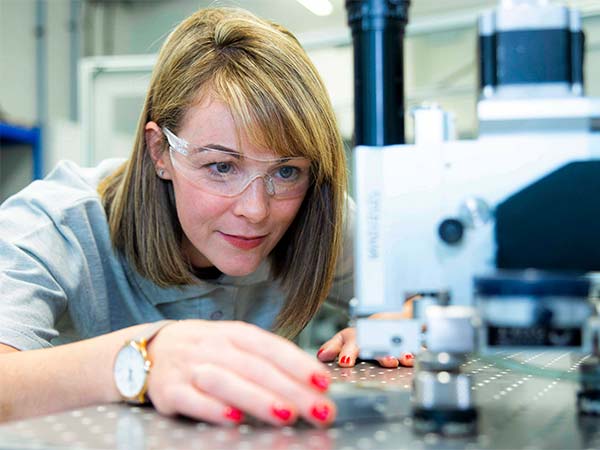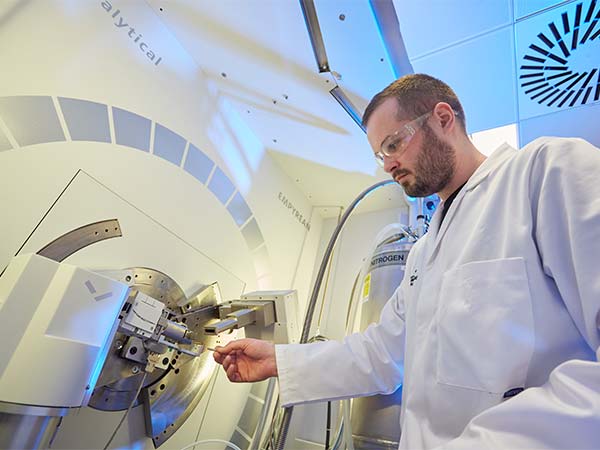
Postgraduate researchCentres for Doctoral Training
Centres for Doctoral Training (CDTs) bring PhD students from across disciplines together with industrial partners to address global challenges.
Combining the research and expertise of the partners and a cohort of researchers provides a rich learning environment where postgraduate researchers are trained and supported to reach their full potential.
Typically funded by the UK Government, through UK Research and Innovation, CDTs provide four-year fully funded studentships in a range of disciplines.
Working collaboratively as a cohort of researchers our doctoral students address challenges under specific research themes.
Your CDT experience
As a CDT student at Strathclyde, you can benefit from:
Current CDT PhD opportunities
Duration: 4 years
CDT: Engineering Hydrogen NetZero
This PhD is part of the Engineering Hydrogen NetZero (EnerHy) Centre for Doctoral Training (CDT), a newly established EPSRC-funded initiative focused on advancing research and training in green hydrogen and wind energy.
The University of Strathclyde leads the wind energy research and training components of the programme. Funded by Natural Power and the EPSRC, this studentship, as part of the second EnerHy intake, is centred on advanced analytics for wind energy data.
Duration: 3.5 years
The aim of this interdisciplinary Strathclyde CDT is to meet the needs of the fast-growing green construction industry to optimise building performance and deliver net-zero buildings whilst promoting occupant’s health and wellbeing.
Energy-efficient Indoor Climate Control for Optimised Health
Duration: 4 years
CDT: AQT
We have fully funded PhD positions spanning broad aspects of quantum technology, from technical underpinnings to applications. The core of each student’s doctoral training programme is a cutting-edge, original research project designed in collaboration between the primary academic supervisor, the student and, where applicable, the industrial partner. Work on the PhD project will continue throughout all four years, ensuring that students are embedded in a research environment from day one, while benefitting from cohort-based training in the foundations and applications of quantum technology, as well as skills training and engagement activities with leading industries and through outreach.
Duration: 4 years
CDT: Use-Inspired Photonic Sensing & Metrology - Applied Photonics
The EPSRC Centre for Doctoral Training (CDT) in Use-Inspired Photonic Sensing & Metrology (Applied Photonics) offer both fully funded EngD and PhD opportunities. Students undertake two semesters of cohort based academic training before commencing their research full time with their partner company and university. In years 2 and 3, students undertake 3 business courses and professional skills training.
The CDT is pleased to have been selected to participate in the UK Government’s TechExpert pilot scheme. As part of this initiative, students entering EngD and PhD programmes in 2026 who are eligible for home fee status will receive a generous stipend of £31,000. TechExpert funded students also engage in up to 10 days per year of enriching additional activities, such as outreach to inspire future talent and initiatives that support widening participation in technology careers. In addition to this, students have access to a conference budget of up to £4,000 and tuition fees paid for the for the duration of the programme.
Apply to the Use-Inspired Photonic Sensing & Metrology - Applied Photonics CDT
Duration: 4 years
CDT: EPSRC CDT in Developing National Capability for Materials 4.0
This fully funded PhD project, part of the EPSRC CDT in Developing National Capability for Materials 4.0, will develop AI-driven surrogate models for titanium cogging and integrate them into the FutureForge digital twin at the National Manufacturing Institute Scotland (NMIS). The research will combine physics-based modelling, machine learning, and experimental validation to enable rapid prediction, optimisation, and decision support for industrial forging processes.
AI surrogate modelling to enhance the digital twin of titanium cogging with FutureForge
Duration: 4 years
CDT: Use-Inspired Photonic Sensing & Metrology - Applied Photonics
The EPSRC Centre for Doctoral Training (CDT) in Use-Inspired Photonic Sensing & Metrology (Applied Photonics) offer both fully funded EngD and PhD opportunities. Students undertake two semesters of cohort based academic training before commencing their research full time with their partner company and university. In years 2 and 3, students undertake 3 business courses and professional skills training.
Join the next revolution in global communications, connecting the seabed to space through emerging 6G technologies. This EngD aims to develop advanced underwater optical wireless communication systems to tackle challenges of underwater turbulence and signal distortion by investigating cooperative, spatially distributed transceivers with advanced signal processing.
Apply to the Use-Inspired Photonic Sensing & Metrology - Applied Photonics CDT
Duration: 4 years
This industry funded project seeks, for the first time, to develop a forming assessment strategy for extruded recycled 6000 series aluminium with a particular focus on roll bending. It will investigate the effect of extrusion process parameters such as alloy composition, homogenisation practice, extrusion speed and exit temperature on formability and ductility.
Investigation of the flow behaviour, anisotropy & forming limits of 6000 series aluminium extrusions
Duration: 4 years
CDT: EPSRC Energy Transfer Technologies Doctoral Training Hub
The studentship will focus on developing advanced metrology techniques to detect, classify, and mitigate defects in high-power optical coatings for directed energy systems. The research will investigate defects in ion beam deposited optical coatings that limit the laser-induced damage threshold performance and will explore novel defect removal techniques to enhance the resilience of optical components for defence applications.
Our partners
We work with a number of academic institutions to deliver CDTs, either as the lead institution, or as a partner.










Research is central to everything we do. It informs our teaching and helps us make a difference to business, industry, and society.
Almost 90% of research produced by the University of Strathclyde has been rated ‘world-leading’ or ‘internationally excellent’
(Times Higher Education’s analysis of REF2021)

Cutting-edge facilities
We're transforming the way academics, business, industry and the public sector work in partnership.
National Manufacturing Institute Scotland
The National Manufacturing Institute Scotland (NMIS) is a group of industry-led manufacturing research and development facilities transforming skills, productivity and innovation, helping to make Scotland a global leader in advanced manufacturing.
Technology & Innovation Centre
At the Technology & Innovation Centre (TIC) we're transforming the way academics, business, industry and the public sector work in partnership.
We're working together to find solutions to challenges that matter in areas of economic importance including advanced manufacturing & materials, health & wellbeing, innovation & entrepreneurship, measurement science & enabling technologies and ocean, air & space.


Industry collaboration
We work in partnership with businesses and organisations in several ways. Our staff work on shared projects in areas of mutual interest between Strathclyde and external organisations. These can be co-funded between the University, the organisation and/or research agencies.
Continuous Manufacturing & Crystallisation (CMAC)
The centre for Continuous Manufacturing & Crystallisation (CMAC), is example of this collaboration in practice.
Based in our Technology & Innovation Centre, we're working with companies such as GSK, Novartis and Astrazeneca to create an effective partnership with industry, academia and public bodies with the aim of:
- accelerating the adoption of continuous manufacturing and crystallisation processes
- developing systems and plants for the production of high-value chemical products
- improving the quality of chemical products at lower costs, more quickly and sustainably
While CMAC is located within the University of Strathclyde, several other universities contribute to the team, including academics from:
- University of Glasgow
- Heriot-Watt University
- University of Edinburgh
- University of Cambridge
- Loughborough University
- University of Bath
Opportunities for businesses
Find out more about how your business can collaborate on research projects with our academics.
Strathclyde Doctoral School
Strathclyde Doctoral School provides a vibrant and comprehensive student-centred research and training environment in order to grow and support current and future research talent.
The School encompasses our four Faculties and is committed to enriching the student experience, intensifying research outputs and opportunities, and ensuring training is at the highest level. As a postgraduate researcher you'll automatically become a member of the Strathclyde Doctoral School.